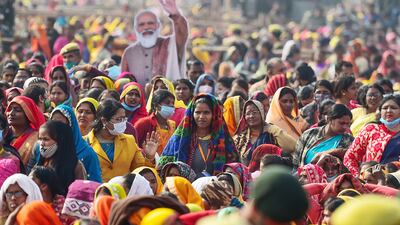Live updates: follow the latest news on Covid-19 variant Omicron
The top court in India's most populous state has urged Prime Minister Narendra Modi to postpone coming regional elections, amid fears that the Omicron coronavirus variant could trigger a third wave of Covid-19 infections in the country.
The appeal by Justice Shekhar Yadav of the Allahabad High Court in Uttar Pradesh called for the government and the national election commission to defer the polls by “one or two months” and to ban election rallies.
Uttar Pradesh is one of seven states due to hold elections to local legislatures early next year, although the dates have not been set.
“Parties are holding rallies and meetings and gathering crowds of lakhs [hundreds of thousands]. If this is not stopped in time, then the result will be more frightening than the second wave,” Mr Yadav said on Thursday.
“Because only if life continues, then election rallies will continue.”
The highly transmissible Omicron variant was first detected in India on December 2. The total number of cases rose by 122 to 360 on Friday.
In a worrying development, India’s Health Ministry said on Friday that analysis of 183 of the Omicron infections showed that 87 were in fully vaccinated people and three involved individuals who had received booster doses.
However, 114 of those infected have recovered, Health Secretary Rajesh Bhushan said.
Mr Bhushan said 89 per cent of India’s over-18 population has received one vaccine dose and 61 per cent has received two doses. India's drive to vaccinate about 944 million adults has relied largely on two vaccines: the AstraZeneca vaccine made by Serum Institute and Bharat Biotech’s domestically developed vaccine.
India has averaged around 7,000 new Covid-19 cases a day in the past two weeks, with 6,650 new infections and 374 deaths reported over 24 hours on Friday.
Most of the roughly 34 million cases and 479,000 deaths recorded since the pandemic began came during a deadly second wave in April and May, which was driven by the Delta variant.
The head of the government’s Covid task force said last week that India could see up to 1.4 million new cases a day as a result of Omicron.
The federal Ministry of Health has advised regional governments to set up war rooms and impose curfews to tackle the threat. Several states and cities have imposed new restrictions and banned gatherings over Christmas and New Year to stop its spread.
But political parties have been mobilising tens of thousands of people for electoral rallies in states due to go to the polls. The scenario is similar to regional elections held during the second wave, when politicians – including Mr Modi – held massive campaign rallies, despite an explosion in Covid-19 cases across the country.
A maskless Mr Modi on Thursday addressed tens of thousands of his supporters in Varanasi, in Uttar Pradesh, hours after he chaired a national meeting in New Delhi on the emerging Covid threat in the country and directed regional governments to maintain a “high level of vigil”.
Two days earlier, he addressed 200,000 women supporters in Allahabad, while launching several programmes for self-help groups.
Uttar Pradesh is considered a bellwether state and Mr Modi’s Bharatiya Janata Party is seeking to retain control of the state legislature in the face of a strong challenge from regional parties.
Akhilesh Yadav, head of the BJP’s main rival in the state, the Samajwadi Party, decided to self-isolate on Thursday after his wife and daughter tested positive for the virus.
Both parties have planned hundreds of rallies across the state in coming weeks – including one on January 9, where the BJP aims to attract a million supporters to hear Mr Modi speak.
Experts say large crowds and lack of social distancing at political rallies could repeat the catastrophe of the second wave, when more than 250,000 people died as the healthcare infrastructure struggled to cope with 20 Covid million cases.
In April, the Madras High Court in Tamil Nadu state blamed India's election commission for the second wave and called for its officials to be tried for murder.
The commission on Friday asked state governments about steps taken to curb the spread of Omicron but did not comment on the threat to public health posed by large political gatherings.
Professor Mathukumalli Vidyasagar, who heads the National Covid-19 Supermodel Committee that monitors the future transmission of infection, said although illness caused by Omicron seems less severe than that caused by the Delta variant, it was better to not have political gatherings, as India will “definitely” have the third wave.
“We will definitely have a third wave. It is already here in small numbers but it will accelerate as it spreads about 2.5 times faster than Delta,” Prof Vidyasagar told The National.
“It is going to spread more quickly … the political rallies will obviously spread the Omicron faster and there will be some adverse impact.”














